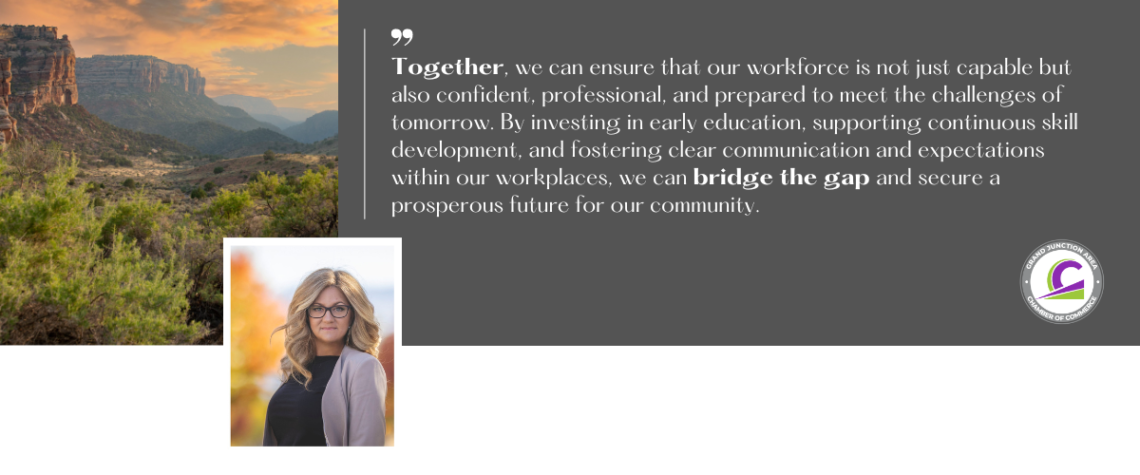
A Message from the CEO
As I go about my day as President & CEO of the Grand Junction Area Chamber of Commerce, I find myself immersed in countless conversations with our local employers. These discussions span the spectrum—celebrating milestones, applauding achievements, and acknowledging another day of open doors. But not all conversations are centered on the good; many touch on the bad and the ugly as well.
One topic that increasingly dominates our conversations is the alarming decline in essential skills—formerly known as “soft skills”—within our workforce. Employers are raising concerns about the lack of self-accountability, conflict management, social skills, hygiene, and professionalism among workers. The question I often hear is, “How did this happen, and how can we be expected to run our businesses while teaching these fundamental skills?”
This isn’t just a local issue; it’s a trend that’s being observed across the nation. This isn’t just a theory; it’s a reality that employers face daily. The growing skill gap makes it harder for businesses to thrive, and it’s putting a strain on our local economy.
Recent research underscores just how critical these social skills are for maintaining effective teamwork, communication, and leadership within organizations. A study published by the National Institutes of Health (NIH) highlights that the decline in social skills is directly linked to decreased productivity, higher employee turnover, and a negative workplace atmosphere. This aligns with the concerns raised by local employers about the lack of essential skills such as self-accountability and professionalism. Without these foundational skills, businesses struggle not only to maintain a productive environment but also to remain competitive in an increasingly challenging market.
At the Grand Junction Chamber, we’re not sitting idly by. We are deeply committed to tackling this concern head-on, working in close collaboration with partners across Mesa County, Western Colorado, the State, and beyond. A key part of our efforts is co-hosting, alongside Mesa County Valley School District 51 and the Mesa County Workforce Center, the first-ever district-wide Workforce Development Day for nearly 1,400 high school juniors. This event is a significant step forward, featuring over 15 industry panels and six skill development panels aimed at furthering students’ career readiness.
In addition to our efforts with the Workforce Development Day, the Chamber is proud to lead the Westslope Works initiative. This program not only creates invaluable work-based learning opportunities for our youth but also fosters generational mentorship environments through employer incentives total nearly $100k in the last year. By providing everyday examples of the essential skills we value through internships, job shadows and apprenticeships, Westslope Works utilizes a “lead by example” approach that continues to shape and develop our next generation of workers. This initiative not only prepares young individuals for the workforce but also reinforces the value of our existing talent, ensuring that the principles of professionalism, accountability, and strong work ethic are passed down and cultivated across generations.
We also recognize that crafting essential skills must start even earlier. Experts agree that preschool & kindergarten is where these critical assets are first taught, valued, and integrated into future habits. Programs like the Riverside Education Center are crucial in encouraging and fostering these impactful traits within our future workforce. Through mentoring and after-school programs, Riverside is helping to instill the skills that are essential for success in both life and work.
When we look toward the efforts of Colorado Mesa University (CMU), we see another vital piece of the puzzle. CMU is actively working to encourage civil and diverse conversations, foster a culture of knowledge and understanding, and pair high-quality education with specific job-related skills. Their commitment to belonging and inclusion along with fostering constructive dialog is a model for how we can contribute to the solution. By valuing these principles, CMU is helping to prepare students not just academically but also socially, ensuring they enter the workforce with the skills necessary to succeed.
This approach stands in stark contrast to what many other higher education institutions are experiencing. According to a report from the Society for Human Resource Management (SHRM), many employers are finding that students are graduating without the essential soft skills needed to succeed in the workplace. The SHRM article notes that employers are increasingly dissatisfied with the level of preparedness of new graduates, particularly in areas like communication, teamwork, and problem-solving.
This contrast highlights the importance of the work CMU is doing and underscores the need for other institutions to follow suit. By prioritizing the development of these essential skills, CMU is helping to ensure that its graduates are not just employable but also equipped to excel in their careers. Our local employers and beyond couldn’t be more appreciative of this comprehensive approach.
But the responsibility doesn’t lie solely with educational institutions. We, as a business community, must work alongside our employers to evaluate our role and how we can continue to set everyone up for success. When we talk about professionalism and accountability, we must ensure that these concepts are clearly defined. The clearer we are with our expectations, the easier it is for our workforce to meet and exceed them.
Our strategy must involve starting earlier in the “talent pipeline,” working in tandem with our partners to ensure that the foundation for these skills is laid down at a young age. This means continuing our partnerships with educational institutions, supporting programs that teach these essential skills, and actively participating in initiatives like Workforce Development Day.
In the end, these conversations I have every day with our local employers underscore one thing: our collective success hinges on addressing the essential skills gap. Together, we can ensure that our workforce is not just capable but also confident, professional, and prepared to meet the challenges of tomorrow. By investing in early education, supporting continuous skill development, and fostering clear communication and expectations within our workplaces, we can bridge the gap and secure a prosperous future for our community.
